Burt A. The Evolution of the British Empire and Commonwealth From the American Revolution
Подождите немного. Документ загружается.

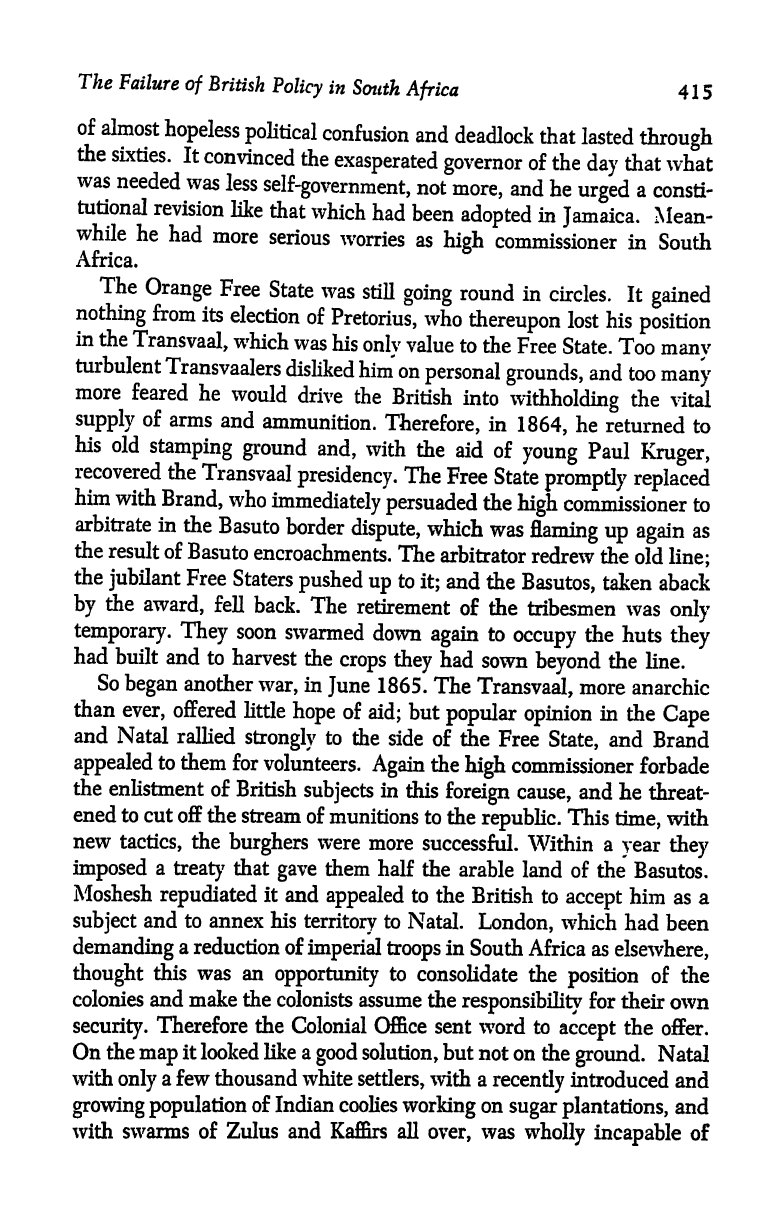
The
Failure
of
British
Policy
in
South
Africa
4
1
5
of
almost
hopeless
political
confusion
and
deadlock
that
lasted
through
the
sixties.
It
convinced
the
exasperated
governor
of the
day
that
what
was
needed
was
less
self-government,
not
more,
and
he
urged
a
consti-
tutional
revision
like
that
which
had
been
adopted
in
Jamaica.
Mean-
while
he
had
more
serious
worries
as
high
commissioner
in
South
Africa.
The
Orange
Free
State
was
still
going
round
in
circles.
It
gained
nothing
from
its
election
of
Pretorius,
who
thereupon
lost his
position
in
the
Transvaal,
which
was
his
only
value
to
the
Free
State.
Too
many
turbulent
Transvaalers
disliked
him
on
personal
grounds,
and
too
many
more
feared
he
would
drive
the
British
into
withholding
the
vital
supply
of
arms
and
ammunition.
Therefore,
in
1864,
he
returned
to
his
old
stamping
ground
and,
with
the
aid
of
young
Paul
Kruger,
recovered
the
Transvaal
presidency.
The
Free
State
promptly
replaced
him
with
Brand,
who
immediately
persuaded
the
high
commissioner
to
arbitrate
in
the
Basuto
border
dispute,
which
was
flaming up again
as
the
result
of
Basuto
encroachments.
The
arbitrator
redrew
the
old
line;
the
jubilant
Free
Staters
pushed
up
to
it;
and
the
Basutos,
taken
aback
by
die
award,
fell
back.
The
retirement
of
the
tribesmen
was
only
temporary.
They
soon
swarmed
down
again
to
occupy
the
huts
they
had
built
and
to
harvest
the
crops
they
had
sown
beyond
the line.
So
began
another
war,
in
June
1865.
The
Transvaal,
more
anarchic
than
ever,
offered
little
hope
of
aid;
but
popular
opinion
in
the
Cape
and
Natal
rallied
strongly
to
the
side
of the
Free
State,
and
Brand
appealed
to them
for
volunteers.
Again
the
high
commissioner
forbade
the
enlistment
of
British
subjects
in
this
foreign
cause,
and he
threat-
ened to cut
off the
stream
of
munitions
to
the
republic.
This
time,
with
new
tactics,
the
burghers
were
more
successful.
Within a
year
they
imposed
a
treaty
that
gave
them
half
the
arable
land of
the
Basutos.
Moshesh
repudiated
it
and
appealed
to
the
British
to
accept
him
as a
subject
and to annex
his
territory
to
Natal.
London,
which
had been
demanding
a
reduction
of
imperial
troops
in
South
Africa
as
elsewhere,
thought
this was an
opportunity
to
consolidate
the
position
of
the
colonies and make the
colonists
assume the
responsibility
for
their
own
security.
Therefore the Colonial
Office
sent word
to
accept
the
offer.
On
the
map
it
looked
like a
good
solution,
but
not on the
ground.
Natal
with
only
a few
thousand
white
settlers,
with a
recently
introduced
and
growing
population
of Indian
coolies
working
on
sugar
plantations,
and
with swarms of
Zulus
and Kaffirs
all
over,
was
wholly
incapable
of
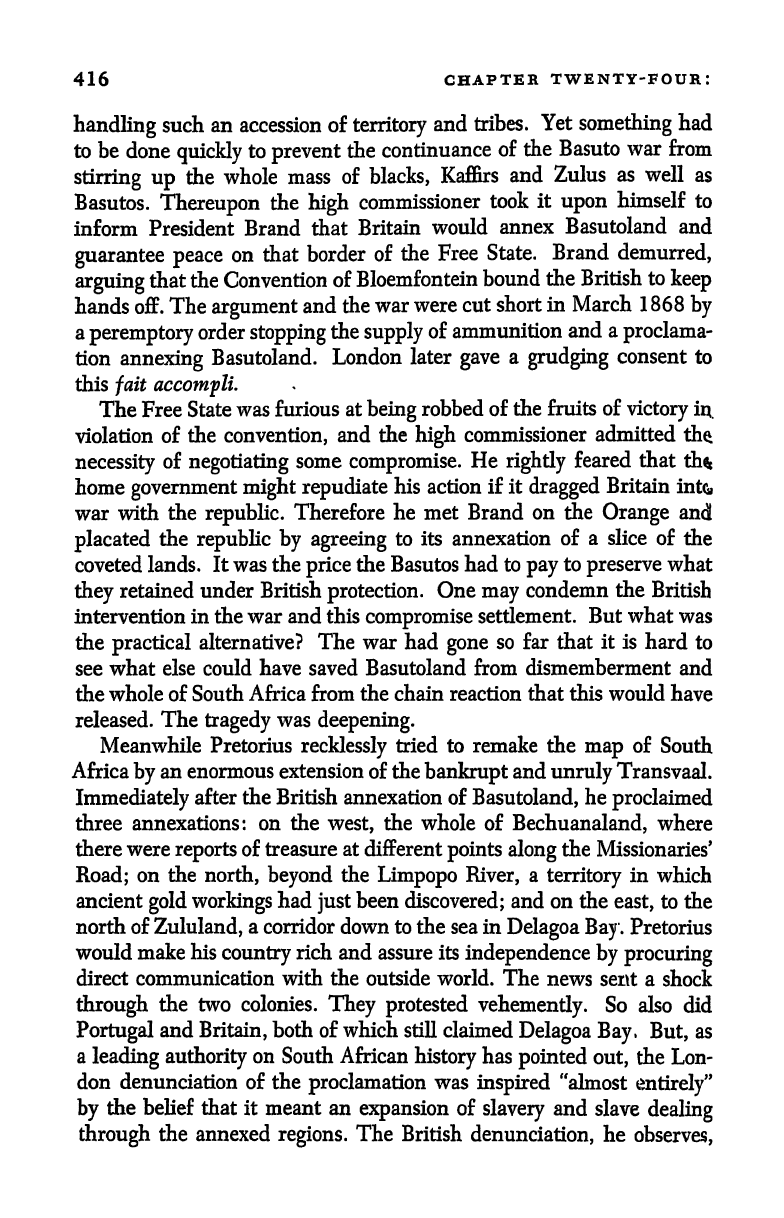
416
CHAPTER
TWENTY-FOUR:
handling
such
an
accession
of
territory
and
tribes.
Yet
something
had
to be done
quickly
to
prevent
the
continuance
of the
Basuto war
from
stirring up
the
whole mass
of
blacks,
Kaffirs
and
Zulus
as
well
as
Basutos.
Thereupon
the
high
commissioner
took
it
upon
himself
to
inform President
Brand
that
Britain
would
annex
Basutoland
and
guarantee
peace
on
that
border
of
the Free
State.
Brand
demurred,
arguing
that
the
Convention
of
Bloemfontein
bound
the British
to
keep
hands off.
The
argument
and the
war
were cut
short
in
March 1
868
by
a
peremptory
order
stopping
the
supply
of
ammunition
and
a
proclama-
tion
annexing
Basutoland.
London
later
gave
a
grudging
consent
to
this
fait
accompli.
The Free State
was furious
at
being
robbed of
the
fruits of
victory
in.
violation
of
the
convention,
and the
high
commissioner
admitted
the*
necessity
of
negotiating
some
compromise.
He
rightly
feared that
th$
home
government
might
repudiate
his action
if it
dragged
Britain
into
war
with the
republic.
Therefore
he met Brand
on
the
Orange
and
placated
the
republic by
agreeing
to its annexation
of
a
slice of
the
coveted
lands.
It was the
price
the Basutos
had to
pay
to
preserve
what
they
retained
under
British
protection.
One
may
condemn
the
British
intervention
in the war
and
this
compromise
settlement.
But what was
the
practical
alternative?
The
war
had
gone
so far that
it
is
hard to
see what
else
could
have
saved
Basutoland from
dismemberment
and
the whole of
South Africa from
the chain reaction that this would
have
released.
The
tragedy
was
deepening.
Meanwhile
Pretorius
recklessly
tried to remake
the
map
of
South
Africa
by
an
enormous
extension of the
bankrupt
and
unruly
Transvaal.
Immediately
after
the
British annexation of
Basutoland,
he
proclaimed
three annexations:
on the
west,
the
whole of
Bechuanaland,
where
there
were
reports
of treasure
at different
points along
the
Missionaries'
Road;
on
the
north,
beyond
the
Limpopo
River,
a
territory
in
which
ancient
gold
workings
had
just
been
discovered;
and on the
east,
to the
north of
Zululand,
a
corridor down to the sea in
Delagoa Bay
.
Pretorius
would make his
country
rich
and
assure
its
independence
by
procuring
direct communication
with the
outside
world.
The
news sent a
shock
through
the
two colonies.
They protested
vehemently.
So
also
did
Portugal
and
Britain,
both of
which still claimed
Delagoa Bay,
But,
as
a
leading
authority
on
South
African
history
has
pointed
out,
the
Lon-
don denunciation of the
proclamation
was
inspired
"almost
entirely"
by
the belief that it meant an
expansion
of
slavery
and
slave
dealing
through
the annexed
regions.
The British
denunciation,
he
observes,
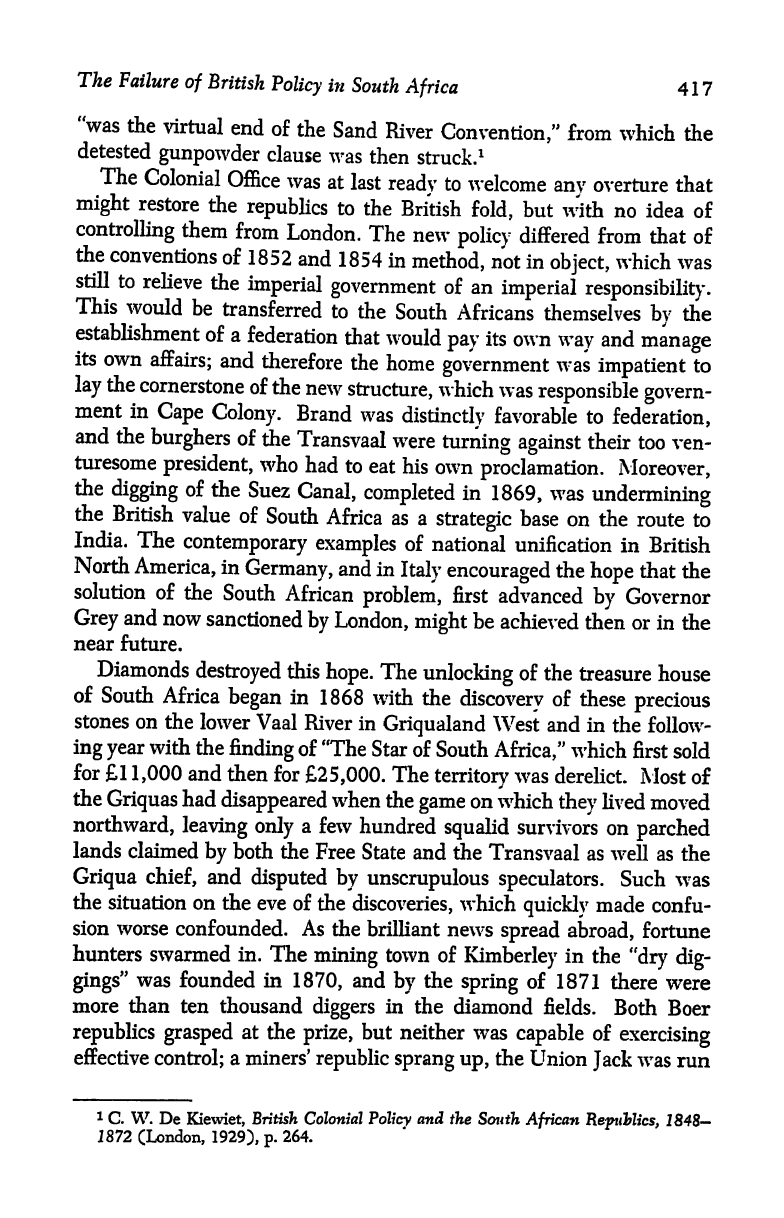
The
Failure
of
British
Policy
in
South
Africa
4 1 7
"was
the
virtual
end
of
the
Sand
River
Convention,"
from
which the
detested
gunpowder
clause
was
then
struck.
1
The
Colonial
Office
was
at
last
ready
to
welcome
any
overture that
might
restore
the
republics
to
the
British
fold,
but with
no idea
of
controlling
them
from
London.
The
new
policy
differed from
that
of
the
conventions
of
1852
and
1854
in
method,
not in
object,
which was
still
to
relieve
the
imperial
government
of
an
imperial
responsibility.
This
would
be
transferred
to
the
South
Africans
themselves
by
the
establishment
of
a
federation
that
would
pay
its
own
way
and
manage
its
own
affairs;
and
therefore
the
home
government
was
impatient
to
lay
the
cornerstone
of
the
new
structure,
which
was
responsible
govern-
ment
in
Cape
Colony.
Brand
was
distinctly
favorable
to
federation,
and the
burghers
of
the
Transvaal
were
turning against
their
too
ven-
turesome
president,
who
had
to
eat
his
own
proclamation.
Moreover,
the
digging
of
the
Suez
Canal,
completed
in
1869,
was
undermining
the
British
value
of
South
Africa
as a
strategic
base
on the
route
to
India.
The
contemporary
examples
of
national
unification in
British
North
America,
in
Germany,
and
in
Italy
encouraged
the
hope
that the
solution
of
the
South
African
problem,
first
advanced
by
Governor
Grey
and
now
sanctioned
by
London,
might
be
achieved then or
in the
near
future.
Diamonds
destroyed
this
hope.
The
unlocking
of
the
treasure
house
of South
Africa
began
in
1868
with
the
discovery
of
these
precious
stones on
the
lower
Vaal
River
in
Griqualand
West
and
in
the
follow-
ing year
with
the
finding
of
"The Star
of South
Africa,"
which
first
sold
for 1
1,000
and
then
for
25,000.
The
territory
was
derelict.
Most
of
the
Griquas
had
disappeared
when
the
game
on
which
they
lived
moved
northward,
leaving only
a
few
hundred
squalid
survivors
on
parched
lands
claimed
by
both
the Free
State
and the
Transvaal as
well as
the
Griqua
chief,
and
disputed
by
unscrupulous
speculators.
Such
was
the
situation on
the eve
of
the
discoveries,
which
quickly
made
confu-
sion worse
confounded. As the
brilliant
news
spread
abroad,
fortune
hunters
swarmed
in.
The
mining
town
of
Kimberley
in
the
"dry
dig-
gings"
was
founded
in
1870,
and
by
the
spring
of
1871
there
were
more than
ten thousand
diggers
in the
diamond
fields.
Both
Boer
republics
grasped
at
the
prize,
but
neither w
r
as
capable
of
exercising
effective
control;
a miners'
republic
sprang
up,
the
Union
Jack
was
run
1
C. W.
De
Kiewiet,
British
Colonial
Policy
and
the South
African
RewUics,
7848-
1872
(London, 1929),
p.
264.
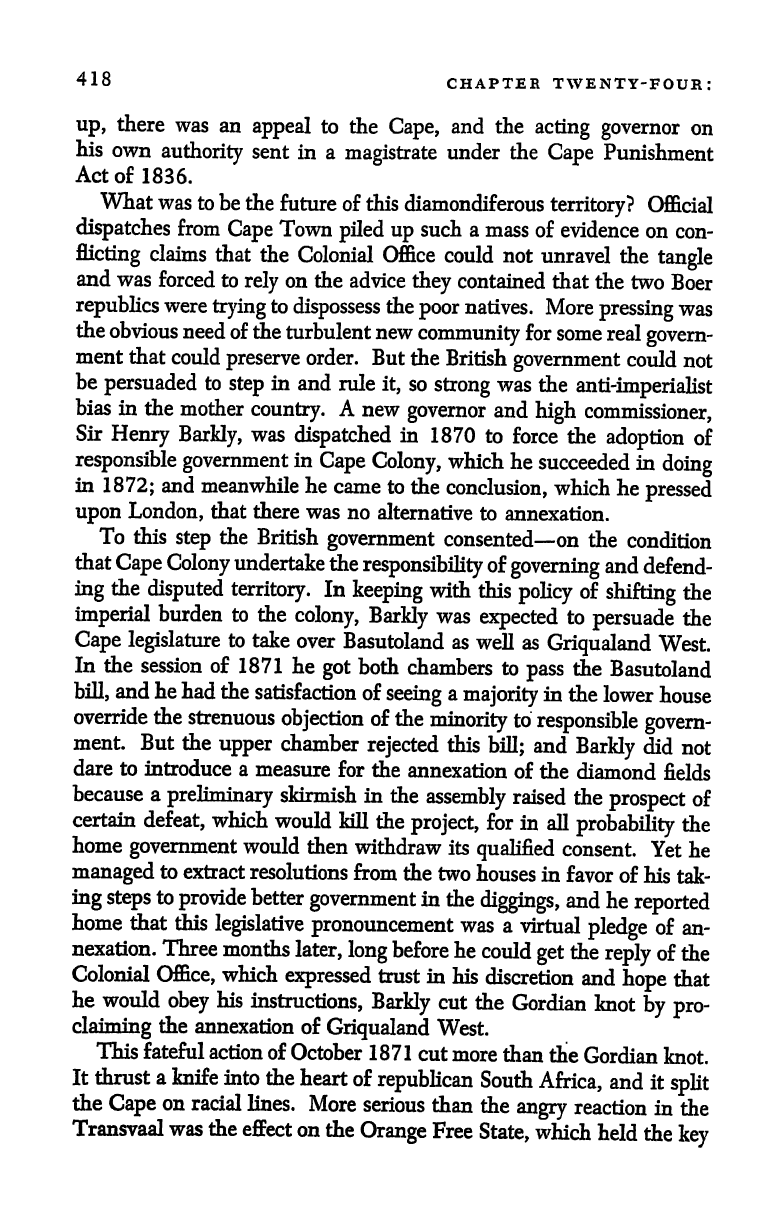
418
CHAPTER
TWENTY-FOUR:
up,
there
was
an
appeal
to
the
Cape,
and the
acting
governor
on
his
own
authority
sent
in
a
magistrate
under the
Cape
Punishment
Act
of
1836.
What
was
to be
the
future
of
this
diamondiferous
territory?
Official
dispatches
from
Cape
Town
piled
up
such
a
mass
of
evidence
on
con-
flicting
claims that
the
Colonial
Office
could
not
unravel
the
tangle
and
was
forced to
rely
on
the
advice
they
contained
that
the
two
Boer
republics
were
trying
to
dispossess
the
poor
natives.
More
pressing
was
the
obvious
need
of
the
turbulent new
community
for
some real
govern-
ment
that
could
preserve
order.
But
the
British
government
could
not
be
persuaded
to
step
in
and rule
it,
so
strong
was
the
anti-imperialist
bias
in
the
mother
country.
A new
governor
and
high
commissioner,
Sir
Henry Barkly,
was
dispatched
in 1870
to
force the
adoption
of
responsible
government
in
Cape
Colony,
which
he
succeeded
in
doing
in
1872;
and
meanwhile
he
came
to
the
conclusion,
which
he
pressed
upon
London,
that there
was
no
alternative to
annexation.
To
this
step
the
British
government
consented on
the
condition
that
Cape
Colony
undertake
the
responsibility
of
governing
and
defend-
ing
the
disputed
territory.
In
keeping
with
this
policy
of
shifting
the
imperial
burden
to
the
colony,
Barkly
was
expected
to
persuade
the
Cape
legislature
to
take
over
Basutoland
as
well as
Griqualand
West.
In the
session
of
1871
he
got
both
chambers
to
pass
the
Basutoland
bill,
and he
had the
satisfaction
of
seeing
a
majority
in
the
lower
house
override the
strenuous
objection
of
the
minority
to
responsible
govern-
ment. But
the
upper
chamber
rejected
this
bill;
and
Barkly
did
not
dare
to
introduce a
measure for
the
annexation
of the
diamond
fields
because a
preliminary
skirmish in
the
assembly
raised the
prospect
of
certain
defeat,
which
would
kill the
project,
for
in all
probability
the
home
government
would then
withdraw
its
qualified
consent.
Yet he
managed
to
extract
resolutions
from
the
two
houses
in
favor of
his
tak-
ing
steps
to
provide
better
government
in
the
diggings,
and
he
reported
home that this
legislative
pronouncement
was
a
virtual
pledge
of
an-
nexation. Three
months
later,
long
before
he
could
get
the
reply
of
the
Colonial
Office,
which
expressed
trust
in
his
discretion
and
hope
that
he would
obey
his
instructions,
Barkly
cut
the
Gordian
knot
by
pro-
claiming
the
annexation
of
Griqualand
West.
This fateful
action
of
October
1871
cut
more
than
the
Gordian
knot.
It
thrust a
knife
into the
heart
of
republican
South
Africa,
and it
split
the
Cape
on
racial
lines.
More
serious
than
the
angry
reaction
in
the
Transvaal was
the
effect
on
the
Orange
Free
State,
which
held
the
key
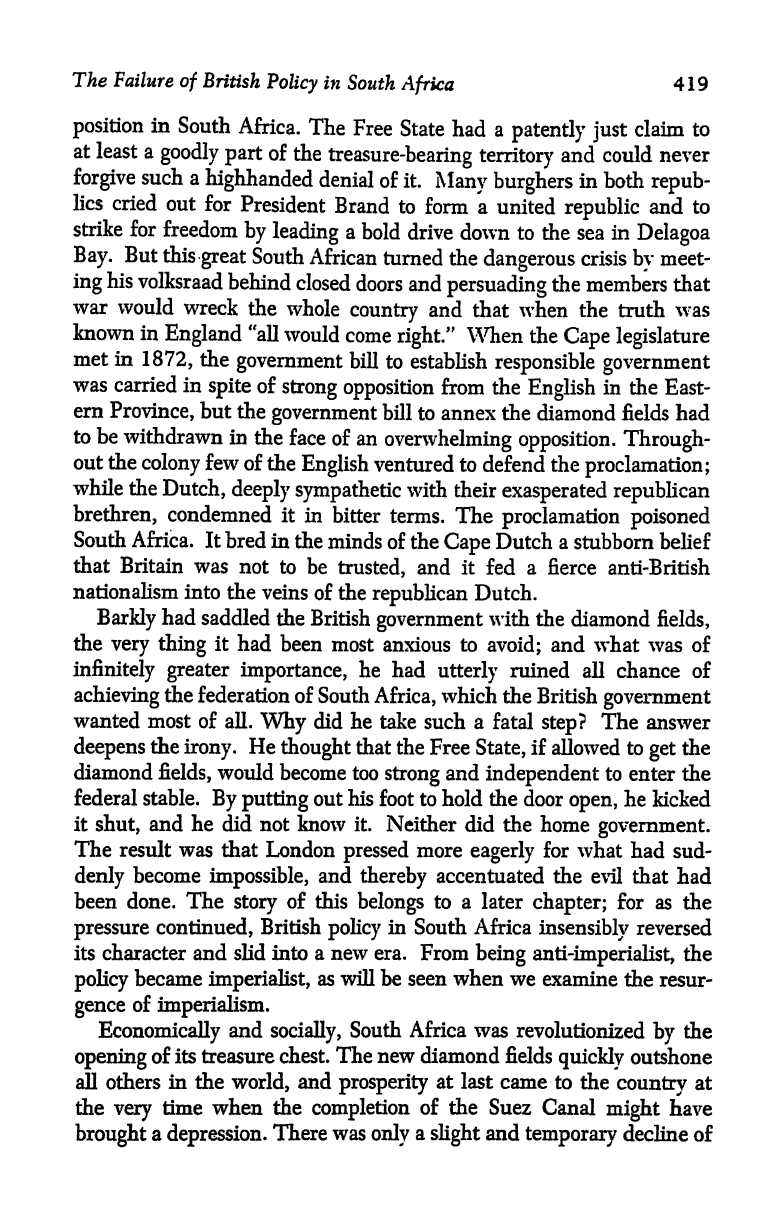
The
Failure
of
British
Policy
in
South
Africa
419
position
in
South
Africa.
The
Free
State
had
a
patently just
claim to
at least a
goodly
part
of
the
treasure-bearing territory
and could
never
forgive
such
a
highhanded
denial
of
it.
Many
burghers
in both
repub-
lics
cried out
for
President
Brand
to
form
a
united
republic
and
to
strike for
freedom
by
leading
a
bold
drive
down to the sea
in
Delagoa
Bay.
But
this
great
South
African
turned
the
dangerous
crisis
by
meet-
ing
his
volksraad
behind
closed
doors and
persuading
the members that
war
would
wreck
the
whole
country
and
that
when the truth
was
known
in
England
"all
would
come
right/'
When
the
Cape legislature
met
in
1872,
the
government
bill
to establish
responsible
government
was
carried in
spite
of
strong opposition
from the
English
in
the East-
ern
Province,
but
the
government
bill
to
annex
the
diamond fields had
to be
withdrawn
in
the
face
of an
overwhelming opposition.
Through-
out the
colony
few
of
the
English
ventured to defend the
proclamation;
while
the
Dutch,
deeply
sympathetic
with
their
exasperated republican
brethren,
condemned it in
bitter
terms.
The
proclamation
poisoned
South
Africa.
It
bred
in the
minds
of the
Cape
Dutch a
stubborn belief
that
Britain
was
not
to be
trusted,
and
it
fed
a
fierce anti-British
nationalism
into
the
veins
of the
republican
Dutch.
Barkly
had
saddled
the British
government
with
the
diamond
fields,
the
very
thing
it
had
been
most
anxious to
avoid;
and what was of
infinitely
greater
importance,
he
had
utterly
ruined all chance
of
achieving
the
federation
of South
Africa,
which the
British
government
wanted most of all.
Why
did
he
take such a
fatal
step?
The
answer
deepens
the
irony.
He
thought
that
the
Free
State,
if
allowed to
get
the
diamond
fields,
would become too
strong
and
independent
to enter the
federal
stable.
By
putting
out his foot
to hold
the
door
open,
he kicked
it
shut,
and he did not
know
it. Neither
did the
home
government.
The result
was
that
London
pressed
more
eagerly
for
what
had sud-
denly
become
impossible,
and
thereby
accentuated the
evil
that had
been
done.
The
story
of this
belongs
to
a
later
chapter;
for
as the
pressure
continued,
British
policy
in
South
Africa
insensibly
reversed
its
character and slid
into
a new era.
From
being anti-imperialist,
the
policy
became
imperialist,
as will be seen when
we
examine the
resur-
gence
of
imperialism.
Economically
and
socially,
South Africa was
revolutionized
by
the
opening
of
its treasure chest.
The
new
diamond fields
quickly
outshone
all others
in the
world,
and
prosperity
at
last came
to
the
country
at
the
very
time when
the
completion
of the
Suez
Canal
might
have
brought
a
depression.
There was
only
a
slight
and
temporary
decline of
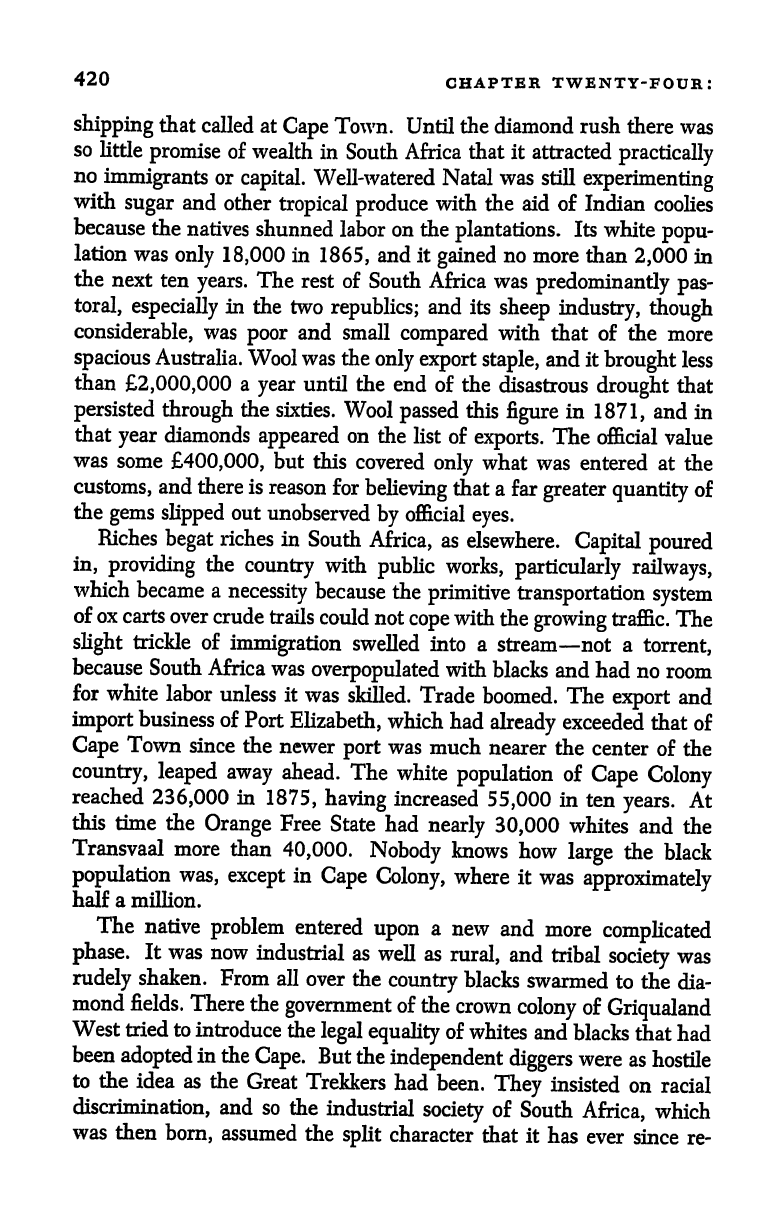
420
CHAPTER
TWENTY-FOUR:
shipping
that
called at
Cape
Town. Until
the
diamond
rush
there
was
so
little
promise
of
wealth in
South
Africa that it attracted
practically
no
immigrants
or
capital.
Well-watered Natal
was
still
experimenting
with
sugar
and
other
tropical produce
with
the
aid of Indian
coolies
because
the
natives
shunned labor on the
plantations.
Its
white
popu-
lation
was
only
18,000
in
1865,
and
it
gained
no
more than
2,000
in
the
next
ten
years.
The rest of
South
Africa
was
predominantly
pas-
toral,
especially
in
the
two
republics;
and
its
sheep
industry,
though
considerable,
was
poor
and small
compared
with that
of
the
more
spacious
Australia.
Wool was
the
only
export
staple,
and
it
brought
less
than
2,000,000
a
year
until the
end
of the
disastrous
drought
that
persisted
through
the
sixties.
Wool
passed
this
figure
in
1871,
and in
that
year
diamonds
appeared
on
the
list
of
exports.
The official
value
was
some
400,000,
but
this
covered
only
what was entered
at
the
customs,
and
there
is
reason
for
believing
that a far
greater quantity
of
the
gems slipped
out
unobserved
by
official
eyes.
Riches
begat
riches
in
South
Africa,
as
elsewhere.
Capital
poured
in,
providing
the
country
with
public
works,
particularly
railways,
which
became a
necessity
because
the
primitive
transportation
system
of ox
carts over
crude
trails
could
not
cope
with
the
growing
traffic.
The
slight
trickle
of
immigration
swelled
into
a
stream
not a
torrent,
because
South
Africa
was
overpopulated
with
blacks
and
had no
room
for white
labor
unless
it
was
skilled.
Trade boomed. The
export
and
import
business
of
Port
Elizabeth,
which
had
already
exceeded that
of
Cape
Town
since
the
newer
port
was
much
nearer
the center
of
the
country,
leaped
away
ahead.
The
white
population
of
Cape
Colony
reached
236,000
in
1875,
having
increased
55,000
in
ten
years.
At
this time
the
Orange
Free
State
had
nearly
30,000
whites
and the
Transvaal more
than
40,000.
Nobody
knows how
large
the
black
population
was,
except
in
Cape
Colony,
where
it
was
approximately
half a
million.
The
native
problem
entered
upon
a
new
and
more
complicated
phase.
It was
now
industrial as
well as
rural,
and
tribal
society
was
rudely
shaken.
From
all over
the
country
blacks
swarmed
to the
dia-
mond fields.
There
the
government
of
the
crown
colony
of
Griqualand
West tried to
introduce
the
legal
equality
of
whites
and
blacks
that
had
been
adopted
in
the
Cape.
But
the
independent
diggers
were
as
hostile
to the idea
as the
Great
Trekkers
had
been.
They
insisted on
racial
discrimination,
and so
the
industrial
society
of
South
Africa,
which
was
then
born,
assumed
the
split
character
that
it
has
ever
since
re-
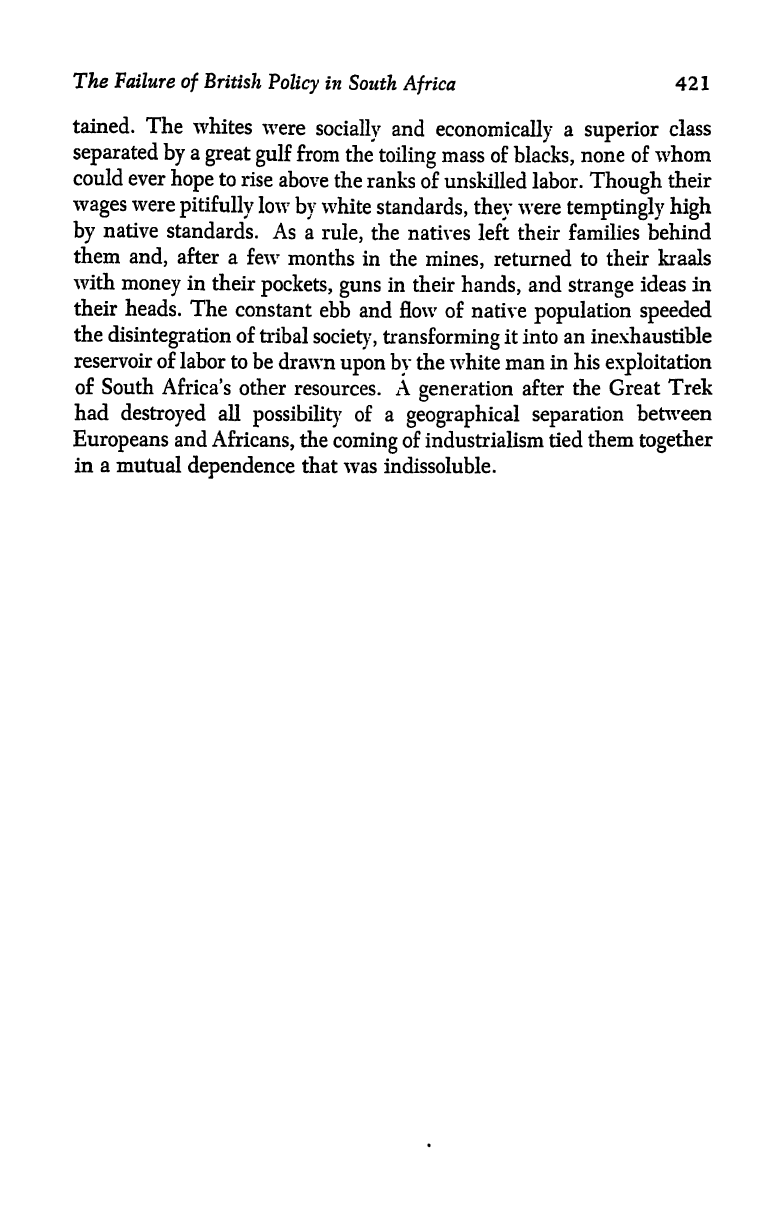
The
Failure
of
British
Policy
in
South
Africa
42
1
tained.
The
whites
were
socially
and
economically
a
superior
class
separated
by
a
great
gulf
from
the
toiling
mass
of
blacks,
none of
whom
could ever
hope
to
rise
above the
ranks
of
unskilled
labor.
Though
their
wages
were
pitifully
low
by
white
standards,
they
were
temptingly
high
by
native
standards.
As a
rule,
the natives left their
families behind
them
and,
after
a
few
months in
the
mines,
returned
to their
kraals
with
money
in
their
pockets,
guns
in their
hands,
and
strange
ideas
in
their
heads.
The
constant
ebb
and
flow
of native
population
speeded
the
disintegration
of
tribal
society,
transforming
it into
an
inexhaustible
reservoir
of
labor
to
be
drawn
upon
by
the white man
in his
exploitation
of
South
Africa's
other
resources.
A
generation
after the Great
Trek
had
destroyed
all
possibility
of a
geographical
separation
between
Europeans
and
Africans,
the
coming
of industrialism
tied
them
together
in
a
mutual
dependence
that was
indissoluble.
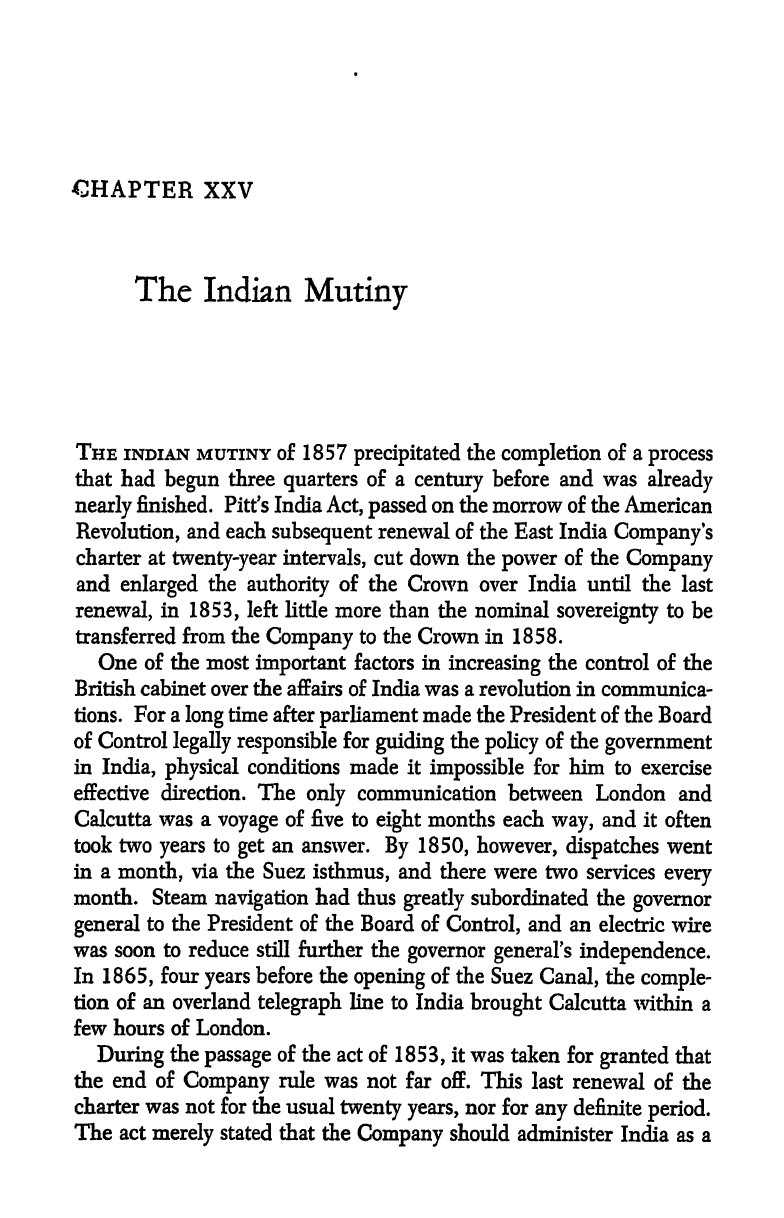
CHAPTER
XXV
The
Indian
Mutiny
THE INDIAN MUTINY of 1857
precipitated
the
completion
of
a
process
that
had
begun
three
quarters
of
a
century
before
and was
already
nearly
finished. Pitt's India
Act,
passed
on the
morrow of the
American
Revolution,
and each
subsequent
renewal of
the
East India
Company's
charter
at
twenty-year
intervals,
cut
down
the
power
of the
Company
and
enlarged
the
authority
of the
Crown over India until
the last
renewal,
in
1853,
left
little more than
the nominal
sovereignty
to
be
transferred
from the
Company
to
the
Crown
in
1858.
One
of
the
most
important
factors in
increasing
the
control of the
British cabinet
over the
affairs of India was a
revolution
in
communica-
tions.
For a
long
time
after
parliament
made
the
President of the
Board
of Control
legally
responsible
for
guiding
the
policy
of
the
government
in
India,
physical
conditions made it
impossible
for him
to
exercise
effective
direction. The
only
communication between London
and
Calcutta was
a
voyage
of five
to
eight
months
each
way,
and
it
often
took
two
years
to
get
an
answer.
By
1850,
however,
dispatches
went
in
a
month,
via
the Suez
isthmus,
and
there were
two
services
every
month. Steam
navigation
had
thus
greatly
subordinated the
governor
general
to the President of the
Board of
Control,
and an
electric
wire
was
soon to reduce still further
the
governor
general's
independence.
In
1865,
four
years
before the
opening
of
the
Suez
Canal,
the
comple-
tion of
an overland
telegraph
line
to India
brought
Calcutta
within
a
few
hours
of
London.
During
the
passage
of
the
act of
1853,
it was
taken
for
granted
that
the
end
of
Company
rule
was
not far
off. This
last
renewal of
the
charter
was
not
for the
usual
twenty years,
nor for
any
definite
period.
The act
merely
stated
that
the
Company
should
administer
India
as
a
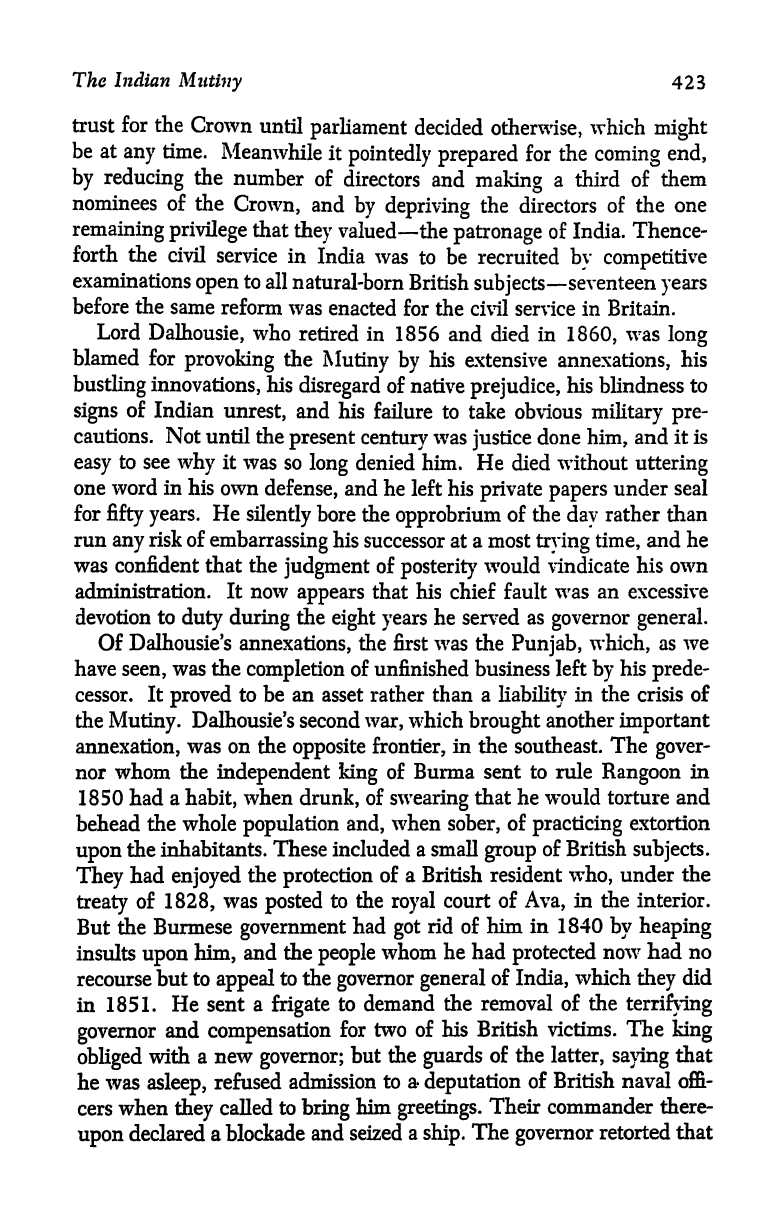
The
Indian
Mutiny
423
trust
for the
Crown
until
parliament
decided
otherwise,
which
might
be
at
any
time.
Meanwhile
it
pointedly
prepared
for the
coming
end,
by
reducing
the
number
of
directors
and
making
a third of
them
nominees
of the
Crown,
and
by
depriving
the directors
of the one
remaining
privilege
that
they
valued
the
patronage
of
India.
Thence-
forth
the
civil
service
in
India
was
to
be recruited
by competitive
examinations
open
to
all
natural-born
British
subjects
seventeen
years
before
the
same
reform
was
enacted for the civil service in Britain.
Lord
Dalhousie,
who
retired in
1856 and
died
in
1860,
was
long
blamed
for
provoking
the
Mutiny by
his
extensive
annexations,
his
bustling
innovations,
his
disregard
of native
prejudice,
his blindness
to
signs
of
Indian
unrest,
and
his
failure to take obvious
military pre-
cautions. Not until
the
present
century
was
justice
done
him,
and
it
is
easy
to see
why
it
was so
long
denied him. He
died
without
uttering
one word
in
his
own
defense,
and he left
his
private papers
under
seal
for
fifty years.
He
silently
bore
the
opprobrium
of the
day
rather
than
run
any
risk of
embarrassing
his
successor at
a
most
trying
time,
and he
was
confident that the
judgment
of
posterity
would
vindicate his own
administration.
It
now
appears
that
his
chief fault
was
an
excessive
devotion
to
duty
during
the
eight years
he served
as
governor
general.
Of
Dalhousie's
annexations,
the
first
was
the
Punjab,
which,
as
we
have
seen,
was
the
completion
of unfinished
business
left
by
his
prede-
cessor.
It
proved
to be
an
asset rather than a
liability
in the
crisis
of
the
Mutiny.
Dalhousie's second
war,
which
brought
another
important
annexation,
was on
the
opposite
frontier,
in
the southeast.
The
gover-
nor
whom the
independent king
of
Burma
sent
to
rule
Rangoon
in
1850 had a
habit,
when
drunk,
of
swearing
that
he would
torture and
behead
the whole
population
and,
when
sober,
of
practicing
extortion
upon
the inhabitants.
These
included
a small
group
of British
subjects.
They
had
enjoyed
the
protection
of
a British resident
who,
under
the
treaty
of
1828,
was
posted
to the
royal
court
of
Ava,
in the interior.
But the
Burmese
government
had
got
rid of
him
in 1840
by
heaping
insults
upon
him,
and the
people
whom
he had
protected
now had
no
recourse
but to
appeal
to
the
governor
general
of
India,
which
they
did
in 1851.
He
sent
a
frigate
to demand
the removal
of
the
terrifying
governor
and
compensation
for
two of his British
victims.
The
king
obliged
with a
new
governor;
but
the
guards
of
the
latter,
saying
that
he
was
asleep,
refused
admission
to
a
deputation
of
British naval offi-
cers
when
they
called
to
bring
him
greetings.
Their commander there-
upon
declared
a blockade
and seized
a
ship.
The
governor
retorted
that
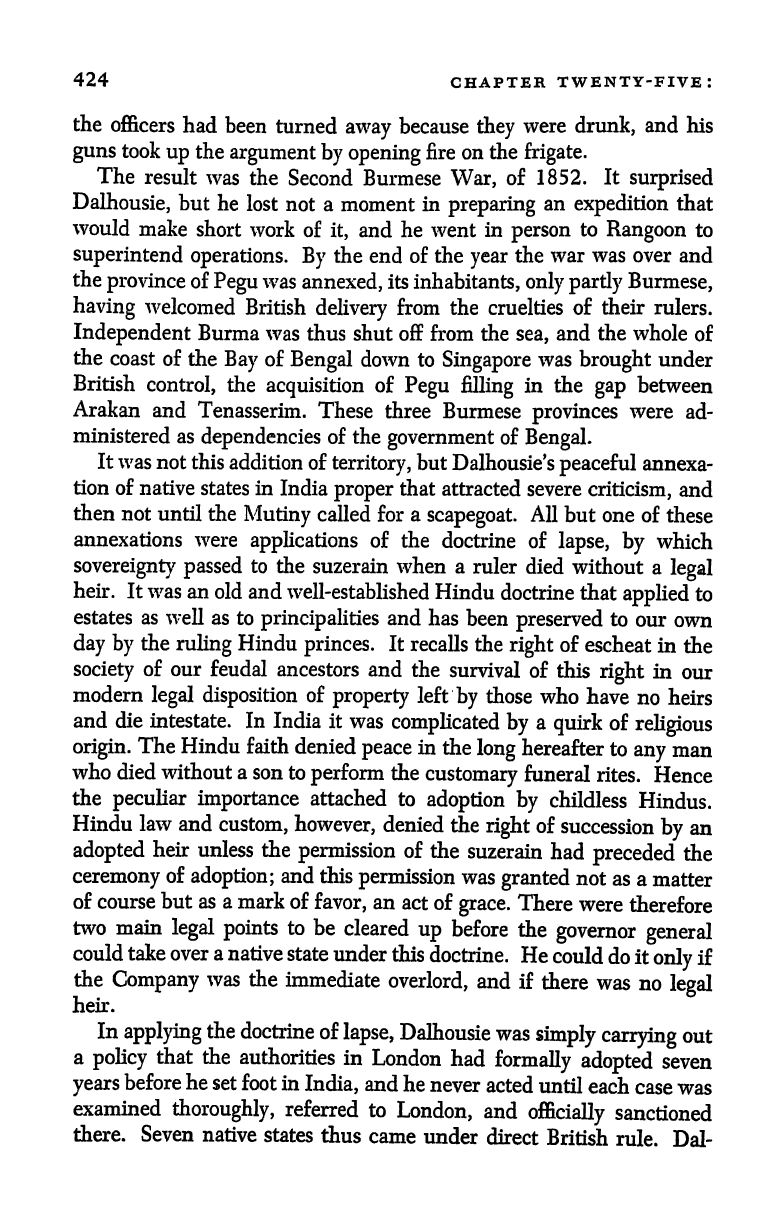
424
CHAPTER
TWENTY-FIVE:
the
officers
had
been
turned
away
because
they
were
drunk,
and
his
guns
took
up
the
argument
by
opening
fire
on
the
frigate.
The
result
was
the
Second
Burmese
War,
of
1852.
It
surprised
Dalhousie,
but
he
lost
not
a
moment
in
preparing
an
expedition
that
would
make
short work
of
it,
and
he went
in
person
to
Rangoon
to
superintend
operations.
By
the
end
of
the
year
the
war was over
and
the
province
of
Pegu
was
annexed,
its
inhabitants,
only
partly
Burmese,
having
welcomed British
delivery
from the
cruelties
of
their
rulers.
Independent
Burma
was thus shut off from
the
sea,
and
the
whole
of
the
coast
of
the
Bay
of
Bengal
down
to
Singapore
was
brought
under
British
control,
the
acquisition
of
Pegu filling
in the
gap
between
Arakan
and
Tenasserim. These
three
Burmese
provinces
were
ad-
ministered as
dependencies
of the
government
of
Bengal.
It
was not
this
addition of
territory,
but
Dalhousie's
peaceful
annexa-
tion of
native
states in
India
proper
that
attracted severe
criticism,
and
then not
until
the
Mutiny
called for
a
scapegoat.
All but one
of
these
annexations were
applications
of
the
doctrine of
lapse,
by
which
sovereignty passed
to the suzerain when
a
ruler
died without
a
legal
heir.
It was an
old and
well-established
Hindu
doctrine
that
applied
to
estates as
well
as
to
principalities
and
has
been
preserved
to our
own
day by
the
ruling
Hindu
princes.
It
recalls the
right
of
escheat
in
the
society
of our
feudal ancestors
and the
survival of
this
right
in
our
modern
legal
disposition
of
property
left
by
those
who
have
no
heirs
and die
intestate.
In India it
was
complicated
by
a
quirk
of
religious
origin.
The
Hindu
faith
denied
peace
in
the
long
hereafter
to
any
man
who died without
a
son
to
perform
the
customary
funeral
rites.
Hence
the
peculiar importance
attached
to
adoption
by
childless
Hindus.
Hindu
law
and
custom,
however,
denied
the
right
of
succession
by
an
adopted
heir
unless the
permission
of
the
suzerain
had
preceded
the
ceremony
of
adoption;
and this
permission
was
granted
not
as
a
matter
of course
but as a mark
of
favor,
an
act
of
grace.
There
were
therefore
two
main
legal points
to
be
cleared
up
before
the
governor
general
could
take over a
native
state
under
this
doctrine.
He
could
do
it
only
if
the
Company
was the
immediate
overlord,
and if
there
was
no
legal
heir.
In
applying
the
doctrine
of
lapse,
Dalhousie
was
simply
carrying
out
a
policy
that
the
authorities
in
London
had
formally
adopted
seven
years
before he
set
foot in
India,
and
he
never
acted
until
each
case
was
examined
thoroughly,
referred
to
London,
and
officially
sanctioned
there.
Seven
native
states
thus
came
under
direct
British
rule.
Dal-
